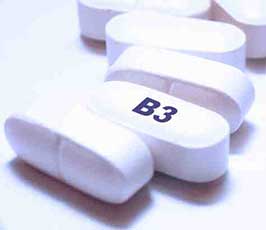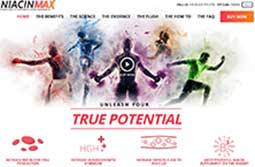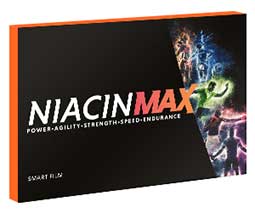 Niacin (nicotinic acid, Vitamin B3) is an important nutrient. If you don’t get enough of it you may become anaemic, be plagued by feelings of fatigue, or suffer from lesions of the skin.
Niacin (nicotinic acid, Vitamin B3) is an important nutrient. If you don’t get enough of it you may become anaemic, be plagued by feelings of fatigue, or suffer from lesions of the skin.
Niacin deficiency is not nice, so taking a niacin supplement is never a bad thing and, if you are a bodybuilder or athlete, it can be a very good thing indeed. You will be able to train harder and reap improved benefits.
Niacin has been a key ingredient in sports supplements for many years, so most people who take their training seriously will be aware what a powerful ally it can be. However, there tends to be so much focus on niacin’s ability to provide vasodilation, its other muscle-boosting capabilities are often overlooked.
 NiacinMax is now available – the strongest, fast working, most effective niacin supplement on the market. Simply place a NiacinMax strip on your tongue first thing in the morning on an empty stomach and let it dissolve. When the Niacin ingredients get to work it will…
NiacinMax is now available – the strongest, fast working, most effective niacin supplement on the market. Simply place a NiacinMax strip on your tongue first thing in the morning on an empty stomach and let it dissolve. When the Niacin ingredients get to work it will…
- Increase oxygen circulation by around 50%
- Widen blood vessels and increase red blood cell count
- Supply you with extra energy
- Boost testosterone levels, accelerate the healing process
- Increase Human Growth Hormone levels by more than 600%
Niacin and Vasodilation
Vasodilation is a slight widening of the blood vessels that is a natural response to exercise. When the blood vessels are dilated the blood can flow more easily. This lowers the blood pressure and helps take some of the strain off the heart. The improvements in circulation that occur during periods of vasodilation can also boost mental focus because the brain receives an increased amount of oxygen and important nutrients. The muscles reap similar benefits and the availability of extra nutrients and oxygen makes it easier to train harder. The level of vasodilation that occurs during such periods is quite limited, but numerous scientific studies, including one conducted at the University of Western Australia, show supplementation with niacin can improve vasodilation. This is why niacin has become such a popular inclusion in pre-workout supplements. People who use such supplements may notice their improved abilities, and increased strength and muscle gains, and believe it is all due to vasodilation. This is far from being the case.
Niacin and Red Blood Cells
The body uses niacin to create the red blood cells that are necessary for so many important biological functions, including the transportation of oxygen to the muscles and vital organs. A sufficient amount of red blood cells are also necessary for efficient clotting ability.
Niacin For Energy
The next time you pick up a can of Red Bull, or any other popular brand of energy drink, take a close look at the list of ingredients and don’t be surprised when you see niacin listed there (possibly as nicotinic acid or Vitamin B3). It is not added without good reason. The body gets most of its energy from the carbohydrates provided by food. Niacin aids the processing of carbohydrates and helps ensure the body makes the best use of the food that it is provided with.
Niacin and Human Growth Hormone (HGH)
Human growth hormone is manufactured by the pituitary gland. It provides many benefits, but is particularly valuable to bodybuilders and other athletes because it can boost testosterone levels, accelerate the healing process, and improve muscle growth and strength. HGH also improves the body’s ability to burn fat.
The problem is, after adolescence, the pituitary gland stops producing as much HGH. Even by the age of 25, the amount of HGH in the body is severely diminished. Fortunately, it does not have to be that way. Research shows supplementation with niacin can boost HGH levels by over 600%.
One of the most interesting niacin studies was conducted in 1983 (H. J. Quabbe, et al).
Niacin is known to have value as a cholesterol management device and the scientists were originally interested in learning more about the value of niacin in this regard. The data they gathered showed the test subjects had less (bad) cholesterol in their blood, but it also revealed something unexpected. The test subjects had unusually high levels of HGH.
During the early 1990s, scientists in Denmark conducted a niacin study that was designed to focus entirely on niacin’s ability to boost HGH. They recruited 60 volunteers and split them into two groups.
One group received niacin (350mg) supplements every day. The other group was given a placebo. The study period was four weeks and the resultant data revealed the HGH levels of the people in the placebo group remained about the same for the full four weeks. The HGH levels in the niacin group were elevated by over 400% during the entire study period.
Several other studies, including one published in the scientific journal Hormones and Behaviour, reveals the HGH boosting power of niacin can be further improved when it is taken within a few hours of exercise, and an increase of 600% or more is not uncommon.
Final Thoughts
 People who want to achieve sporting success, in bodybuilding or any other athletic pursuit, need to train hard. Niacin can help them to do this and its ability to provide the brain with extra oxygen should also help them to train smart.
People who want to achieve sporting success, in bodybuilding or any other athletic pursuit, need to train hard. Niacin can help them to do this and its ability to provide the brain with extra oxygen should also help them to train smart.
Many foods, including tuna, and lamb’s liver, are high in niacin, so it is possible to adjust the diet so that it provides and increased amount of niacin, but supplements can be a better option because they are generally assimilated faster, allowing the effects to kick-in sooner.
Vitamin B it from food or from a supplement bottle, niacin has a lot to offer and should never be seen as nothing more that a vasodilator.
